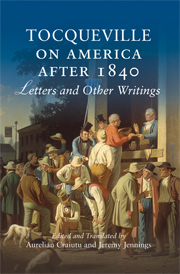Book contents
- Frontmatter
- Contents
- Editors' Note and Acknowledgments
- Interpretative Essay: The Third Democracy: Tocqueville's Views of America after 1840
- PART I LETTERS
- PART II SPEECHES, ARTICLES, AND DIPLOMATIC PAPERS
- Appendix 1 Tocqueville's American Correspondents
- Appendix 2 Chronology
- Appendix 3 Sources for the Texts and Selected Bibliography
- Notes
- Index
Appendix 1 - Tocqueville's American Correspondents
Published online by Cambridge University Press: 05 June 2012
- Frontmatter
- Contents
- Editors' Note and Acknowledgments
- Interpretative Essay: The Third Democracy: Tocqueville's Views of America after 1840
- PART I LETTERS
- PART II SPEECHES, ARTICLES, AND DIPLOMATIC PAPERS
- Appendix 1 Tocqueville's American Correspondents
- Appendix 2 Chronology
- Appendix 3 Sources for the Texts and Selected Bibliography
- Notes
- Index
Summary
George Bancroft (1800–1891) was a prominent American scholar and diplomat, author of a multi-volume History of the United States (10 volumes, 1834–74; revised into six volumes by the author in 1876 and 1883–1885). Bancroft was well trained in classics and enrolled at Harvard at the age of thirteen. In 1820, he went to Berlin where he had a chance to attend Hegel's and Schleiermacher's lectures. He served as Secretary of the Navy under the Polk administration (1845–1846) and was instrumental in the founding of the U.S. Naval Academy at Annapolis. A supporter of the Mexican War, Bancroft also played a key role in the acquisition of California. He subsequently served as U.S. Minister to London (1846–1849) and Berlin (1867–1874). Bancroft was a supporter of President Buchanan and wrote speeches for Stephen A. Douglas during his 1860s unsuccessful presidential bid. In 1885, he was elected President of the American Historical Association. Bancroft made several visits to Paris from 1847 to 1849 and there he met Tocqueville. For more information, see Mark Anthony de Wolfe Howe, The Life and Letters of George Bancroft, 2 vols (New York: Charles Scribner, 1908) and Lillian Handlin, George Bancroft, The Intellectual as Democrat (New York: Harper & Row, 1984).
N. W. Beckwith. We have surprisingly little information about Beckwith, in spite of the fact that his letters from the late 1850s are among the longest and most interesting ones received by Tocqueville during that period.
- Type
- Chapter
- Information
- Tocqueville on America after 1840Letters and Other Writings, pp. 461 - 468Publisher: Cambridge University PressPrint publication year: 2009



